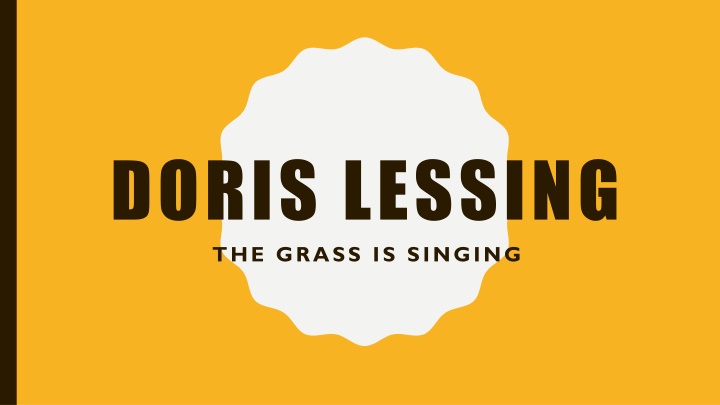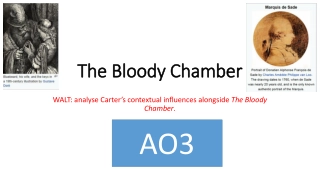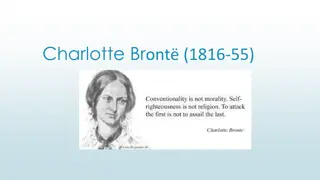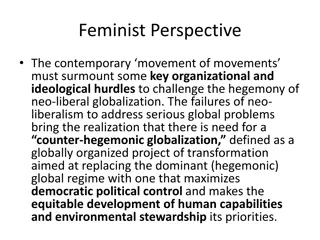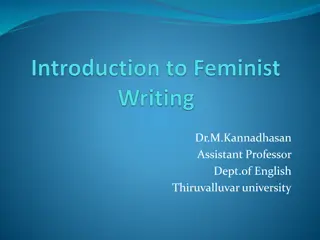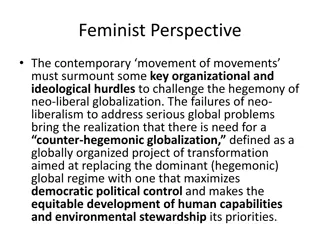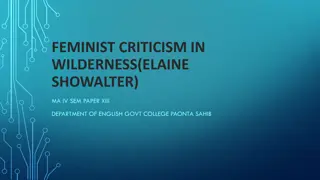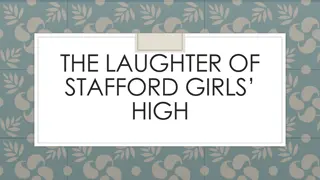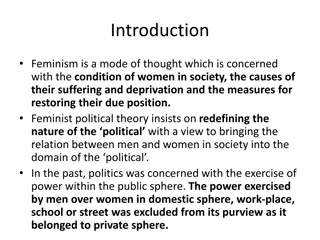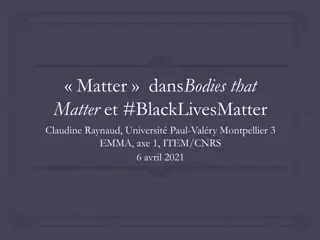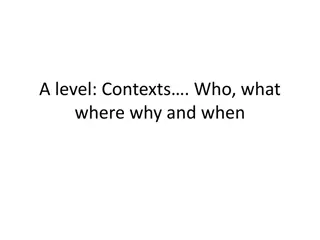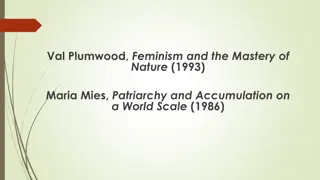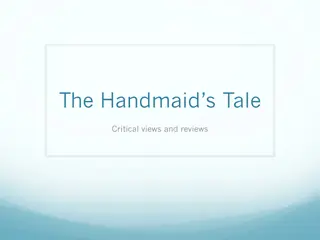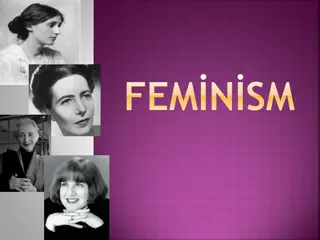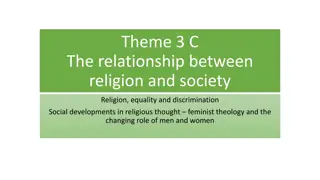Doris Lessing: A Pioneering Writer and Feminist Icon
Doris Lessing, born in Persia and raised in Southern Africa, rose to prominence as a leading post-war English writer. Her work delves into diverse issues such as race, gender politics, and individuality in society. Lessing's novel "The Golden Notebook" solidified her association with the feminist movement, exploring themes of identity and self-discovery. Later, she ventured into fantasy and science fiction with the "Canopus in Argos" series. Despite controversy, her latest novels continue to challenge societal norms and provoke critical discussions.
Download Presentation

Please find below an Image/Link to download the presentation.
The content on the website is provided AS IS for your information and personal use only. It may not be sold, licensed, or shared on other websites without obtaining consent from the author.If you encounter any issues during the download, it is possible that the publisher has removed the file from their server.
You are allowed to download the files provided on this website for personal or commercial use, subject to the condition that they are used lawfully. All files are the property of their respective owners.
The content on the website is provided AS IS for your information and personal use only. It may not be sold, licensed, or shared on other websites without obtaining consent from the author.
E N D
Presentation Transcript
DORIS LESSING THE GRASS IS SINGING
INTRODUCTION DORIS LESSING Born in Persia (present-day Iran) to British parents in 1919. Her family then moved to Southern Africa, where she spent her childhood. When her second marriage ended in 1949, she moved to London, where her first novel,The Grass is Singing, was published in 1950.
INTRODUCTION DORIS LESSING (2) She is widely regarded as one of the most important post-war writers in English. Her novels, short stories and essays have focused on a wide range of twentieth-century issues and concerns, from the politics of race to the politics of gender, to the role of the family and the individual in society. The books in the 'Children of Violence' series (1952-69) are strongly influenced by Lessing's rejection of a domestic family role and her involvement with communism.
INTRODUCTION DORIS LESSING (3) With the publication of her next novel,The Golden Notebook (1962), Lessing became firmly identified with the feminist movement. The novel concerns Anna Wulf, a writer caught in a personal and artistic crisis, who sees her life compartmentalised into various roles - woman, lover, writer, political activist. Her diaries, written in different coloured notebooks, each correspond to a different part of herself. Anna eventually suffers a mental breakdown and it is only through this disintegration that she is able to discover a new 'wholeness' which she writes about in the final notebook. Briefing for a Descent into Hell (1971) The Summer Before the Dark (1973)
INTRODUCTION DORIS LESSING (4) In the late 1970s and early 1980s Doris Lessing turned almost exclusively to writing fantasy and science fiction in the 'Canopus in Argos' series, developing ideas which she had touched on towards the end of 'Children of Violence' and in Briefing for a Descent into Hell. The first book in the series,Re: Colonised Planet 5, Shikasta, was published in 1979. She made a return to realist fiction with Diary of a Good Neighbour (1983) and If the Old Could... (1984), sent to her publisher under the pseudonym Jane Somers. They were turned down for publication several times and when published had only small print runs and few reviews. When the truth was uncovered, the books were, of course, reprinted to much greater acclaim.
INTRODUCTION DORIS LESSING (5) Lessing's more recent novels have continued to confront taboos and challenge preconceptions, generating many different and conflicting critical opinions. In The Good Terrorist (1985), Lessing returned to the political arena, through the story of a group of political activists who set up a squat in London. The book was awarded the WH Smith Literary Award. The Fifth Child (1988) is also concerned with alienation and the dangers inherent in a closed social group. The acclaimed first volume of her autobiography, Under My Skin (1994), won the James Tait Black Memorial Prize (for biography), and was followed by a second volume,Walking in the Shade: Volume II of My Autobiography 1949-1962 (1997).
INTRODUCTION DORIS LESSING (6) Lessing's later fiction includes: Ben, in the World (2000), a sequel to theThe Fifth Child; The Sweetest Dream (2001); the grandmothers (2003), a collection of four short novels; Time Bites (2004), a selection of essays based on her life experiences; Alfred and Emily (2008), which explores the lives of her parents. She was made a Companion of Honour by the British Government in 1999. In 2001 she received the David Cohen British Literature Prize. In 2007, Doris Lessing was awarded the Nobel Prize for Literature.On Not Winning the Nobel Prize (2008) is the full text of the lecture she gave to the Swedish Academy when accepting the prize. She died in 2013, aged 94.
THE GRASS IS SINGIND PLOT
THE GRASS IS SINGING - SUMMARY Set in Southern Rhodesia (now Zimbabwe) during the 1940s. Mary Turner, the wife of Dick Turner, has been murdered, and a houseboy has confessed to the crime. Dick and Mary are poor and do not socialize with the other white settlers in their farming district. When Mary s body is discovered, the Turners neighbor,Charlie Slatter, sends a note to the local police sergeant,Sergeant Denham. Denham then sends six native policemen to the Turners farm, and shortly after they arrive the houseboy,Moses, turns himself in. Charlie drives to the Turners farm to find Moses in handcuffs, and puts Dick in the back of his car.
THE GRASS IS SINGING - SUMMARY (2) Inside the house, Charlie s assistant Tony Marston explains that he found Mary s body on the veranda. Sergeant Denham arrives, and he and Charlie question Tony. However, Tony begins to feel that they are not actually interested in his testimony, and the interview ends abruptly. The policemen take Mary s body to the car, and Tony is left wondering whether he should insist on telling Charlie and Sergeant Denham his theory about why Mary was killed. The next day, Tony packs his things and leaves the farming district. The trial takes place and it is decided that Moses murdered Mary while drunk and hoped to steal valuables from her.
THE GRASS IS SINGING - SUMMARY (3) Chapter 2 begins with a description of the stores that are distributed throughout southern Africa. Mary s father, an alcoholic, would spend their family s little money on liquor at the store, a fact that always caused arguments between Mary s parents. Mary s older brother and sister died of dysentery when she was a child, and the period of grief that followed was the happiest time of her childhood, when her parents briefly stopped squabbling. Mary was eventually sent to boarding school and decided to leave home at 16. Between the ages of 20 and 25, both Mary s parents died, and she was thrilled to be left completely alone. She lived in a club for young women and worked as a personal secretary at an office.
THE GRASS IS SINGING - SUMMARY (4) As the years passed, Mary s friends got married and had children, but Mary herself remained single, happy, and carefree. She was in denial about aging, and still dressed in little-girl fashion. She felt no desire to get married, but one day overheard some married friends of hers gossiping cruelly about the fact that she was not married. After this point, she briefly became engaged to a 55-year-old widower, but called it off when he tried to have sex with her. Soon after this, Mary meets Dick briefly at the cinema. Dick is a poor farmer whose bad luck has led his neighbors to nickname him Jonah. He is resistant to the idea of getting married due to his poverty, but cannot stop thinking of Mary. He works to the point of exhaustion over the next few months, and eventually appears at Mary s door asking to marry her. She agrees, and they marry two weeks later.
THE GRASS IS SINGING - SUMMARY (5) When Mary first arrives at Dick s farm, she finds the house shut and dark and stuffy, and is struck by the evidence of Dick s intense loneliness. They have tea and engage in a polite but awkward conversation. They have sex, which is not as terrible as Mary feared it would be, although she also feels nothing during it. In the morning, Dick introduces Mary to his longtime black house servant,Samson. While Dick clearly feels affection for Samson, Mary is immediately affronted by Samson s casual manner.
THE GRASS IS SINGING - SUMMARY (6) Mary uses her savings to purchase fabrics and other items for the house, and spends her days sewing and painting the house. One day, she comes to believe that Samson stole raisins she was saving to make pudding and becomes hysterical; despite Dick s protests, she insists on taking the money out of Samson s wages. Samson quits, which upsets Dick. They hire another servant, but before long he quits as well. Then they find yet another servant, this time one who is accustomed to working for white women and obeys Mary s demands in a blank, robotic manner. However, in a fit of emotion Mary forces the servant to spend hours scrubbing the (already clean) zinc bathtub, making him work through his lunch break. Charlie and Mrs. Slatter come over to visit; Mrs. Slatter is friendly to Mary, but Mary rebuffs her coldly. The servant quits. A few days later, Charlie advises Dick to plant tobacco, but Dick is resistant to this idea.
THE GRASS IS SINGING - SUMMARY (7) One day, on a rare visit to the local train station to pick up groceries, Dick and Mary encounter a man who addresses Dick as Jonah ; afterward, Dick bitterly admits that he borrowed money from the man and still owes him 50. During this period, Dick goes through a series of obsessions with keeping different animals on the farm; first bees, then pigs, and then turkeys. All these experiments fail, and cause heated arguments between Dick and Mary. Dick eventually resolves to open a kaffir store on the farm, even though there is a kaffir store nearby and thus it is unlikely that Dick s store will make much money. He asks Mary to run the store; at first Mary says she would rather die, but she eventually agrees. Mary begins to fantasize about running away and returning to her old life in the town. One day, she notices that her old office has placed an ad for a shorthand typist. She packs a suitcase and leaves the next day, asking Charlie to drive her to the train station.
THE GRASS IS SINGING - SUMMARY (8) Back in town, at her old office, she is told that the typist position has been filled. Mary returns to her hotel room and realizes she doesn t have enough money to pay the bill. At this moment, Dick arrives, and begs her to come home. Mary agrees. At first Dick and Mary slip back into their previous routine; however, Dick soon becomes severely ill with a fever. Charlie brings over a doctor. During this time, Mary begins supervising the farm workers while Dick is bedridden. She takes a sambok with her, and when Moses (one of the farm workers) insists on getting a drink of water, she strikes him across the face with it. She also withholds wages from the workers who arrive late, causing some of them to quit on the spot. Back at the house, Mary urges Dick to focus on growing tobacco so they will be able to make enough money to leave the farm. Dick thinks about it for three days, before agreeing to start building tobacco barns.
THE GRASS IS SINGING - SUMMARY (9) Dick builds the tobacco barns, but in January there is a drought and the tobacco dies. Dick cannot cover the expenses, and is forced to take out a loan in order to avoid declaring bankruptcy. Mary s health deteriorates. She begins to beg Dick for a child, but Dick refuses, saying that they are too poor. After another house servant leaves, Dick is forced to move Moses from the field to the house, as no one else will agree to work for Mary. Mary develops a fascination with Moses, watching him as he completes his work and even one day staring at him while he washes himself outside. He stops what he is doing and stares back at her until she goes away. This infuriates Mary, who forces Moses to do a series of unnecessary tasks. She asks Dick if they can fire Moses, but Dick angrily refuses.
THE GRASS IS SINGING - SUMMARY (10) Months pass, and Mary becomes increasingly depressed. One day, Moses tells her he is quitting, and she bursts into tears, begging him to stay. Moses gives her a glass of water, tells her to lie down on the bed, and covers her with her coat. He does not mention leaving again. A new dynamic then emerges between them; Moses is much more informal and authoritative with Mary, and Mary now feels completely under his power. During this period, Mary starts having vivid nightmares, while Dick becomes ill with malaria. She dreams that Dick has died, that Moses is touching her, and that her father is making sexual advances on her. In one dream, Moses and her father morph into the same figure, and she wakes up screaming. Moses asks her why she is afraid of him, and Mary replies in a hysterical voice that she is not afraid.
THE GRASS IS SINGING - SUMMARY (11) Meanwhile Dick and Mary s neighbors have started spreading cruel gossip about them. One day, Charlie comes over, and urges Dick to sell his farm. Charlie stays for dinner, where he witnesses Moses and Mary s familiar, flirtatious relationship. Charlie then takes Dick to one side and sternly demands that he and Mary leave. Dick reluctantly agrees, and Charlie asks Tony to start working on Dick s farm in preparation to take over. While living on the Turners farm, Tony comes to believe that Mary has gone mad and needs to be treated by a psychologist. One day, he catches Moses helping Mary to get dressed, and is stunned by the possibility that they are having an affair. He decides to tell Dick to fire Moses, but Moses leaves that evening and does not return.
THE GRASS IS SINGING - SUMMARY (12) Two nights before Dick and Mary are due to leave the farm, Mary wakes up suddenly. She walks around the house in a state of paranoid delusion, swinging wildly between different emotional states. She looks for Moses, convinced that he will finish her that night. Mary is supposed to spend the next day packing, but accidentally falls asleep and wakes up in the late afternoon. She suddenly feels compelled to go to the store, and finds Moses in there. She runs away screaming and bumps into Tony, who gently tells her that he has suggested that Dick take her to a doctor. That night, Mary doesn t eat supper with Tony and Dick. In bed, Dick tells her that she is ill, and Mary responds that she has always been ill in her heart. After Dick is asleep, Mary gets up and creeps around the house, convinced that Moses is there. She goes out to the veranda, where she sees Moses in the distance. He comes toward her, puts a hand over her mouth, and stabs her to death. Moses briefly considers claiming innocence, before resolving to turn himself in. He waits outside the house until morning.
MARY TURNER The daughter of white South African-born parents, Mary s childhood is blighted by her father s alcoholism and her mother s endless misery. There is also a strong suggestion that Mary s father sexually abused her, although this is never stated explicitly; however, it is made clear that events from her childhood leave her repulsed by sex. Once Mary s parents die, she embarks on a joyful and fulfilling life in an unnamed town, working as a secretary, living in a club for single women, and attending social events every night. Mary marries Dick Turner as a result of social pressure, and it is clear almost immediately that she is ill-suited to Dick s rural life. She is a strong-willed, independent, and remarkably feminist woman who resents having to live on someone else s terms. However, the biggest source of conflict in Mary s life comes from her treatment of native people. For reasons that are never made entirely clear, Mary s racism is unusually intense and sadistic. At the same time, she harbors a perverse fascination with native people, and particularly Moses, a farm worker with whom she develops an intimate, possibly sexual relationship. Mary suffers several nervous breakdowns over the course of the novel and by the final chapter is severely mentally incapacitated. Despite (or perhaps because of) this, she accurately predicts the fact that Moses will murder her.
DICK TURNER Mary s husband. Dick is kind and principled, and described by Mary as a good man. However, he is an extraordinarily unsuccessful farmer. Many people including Dick himself interpret his failures as the result of bad luck, and several of Dick s neighbors nickname him Jonah, the name sailors give for someone who brings bad luck to a ship (after the Biblical character Jonah, who was swallowed by a whale). Over the course of the novel, however, it becomes clear that much of Dick s bad luck is in fact the result of irrational fantasies and poor decisions he makes about his farm. Toward the end of the novel, Dick becomes weak and is often sick, a physical manifestation of his weak will. After Mary is murdered, Dick goes mad.
MOSES A native man educated in a missionary school. He has a large, muscular physique and is employed by Dick as a farm worker. During Dick s first illness, when Mary takes over as overseer of the farm workers, she strikes Moses across the face with a sambok. Although Moses is not actually rude in reality, he is not afraid of Mary and refuses to abide by the social conventions governing relationships between native people and white settlers. We learn fairly little about Moses s inner life, but it seems that, perhaps due to his education, he is especially aware of the injustices of colonialism and willing to stand up to white people. The relationship he develops with Mary toward the end of the novel appears somewhat affectionate, however it is never made clear why Moses behaves so kindly to someone who has treated him so badly. At the end of the novel, he approaches Mary on the veranda and stabs her to death. He waits under a nearby tree until morning, when he turns himself in; although we never learn his final fate, the other characters suggest that it is almost certain he will be hanged.
CHARLIE SLATTER A neighbor of the Turners, who thinks of himself as Dick s mentor. A working-class Englishman who previously worked as a grocer in London, he made a fortune through tobacco farming in Southern Rhodesia. He is at times a good friend to Dick, and seems to genuinely have Dick s interests at heart. However, he is also self-interested and strategic, and much of his support for Dick is secretly rooted in the fact that he wants to take over Dick s farm to increase his own profits. Furthermore, Charlie is exceptionally invested in maintaining the racial hierarchy of Southern Rhodesia, which leads him to force Dick and Mary to leave the farm after he comes to believe Mary is having an affair with Moses. After Mary is murdered, Charlie conspires with Sergeant Denham to cover up Mary s relationship with Moses in order to protect the reputation of the white race
MRS. SLATTER She is Charlie s wife (we never learn her first name). At first she appears to be a kind and compassionate person, inviting Mary to social gatherings and commiserating with her over her experience of financial hardship. However, when Mary snubs her, Mrs. Slatter grows spiteful and accuses the Turners of living like pigs.
TONY MARSTON A young, well-educated Englishman who has recently moved to Southern Rhodesia after being inspired by his cousin s success in tobacco farming. Tony holds the racially progressive ideas that are popular in England. At the same time, he is also keen to conform to the norms of the society around him. After Mary s murder, Tony abruptly leaves the farm and ends up working in an office, precisely the kind of work he moved to Southern Rhodesia to avoid.
SERGEANT DENHAM The local police sergeant in the Turners farming district. He is in charge of investigating Mary s death, although this task is made simple by the fact that Moses immediately confesses to the murder. Along with Charlie Slatter, Sergeant Denham helps to cover up the intimacy that existed between Mary and Moses in order to preserve the racial hierarchy
INTIMACY VS HATRED All the characters in The Grass is Singing maintain complex and ambivalent relationships to one another. These relationships are invariably defined by feelings of both intimacy and hatred, which are shown to exist side by side, creating intense conflict and turmoil. The most significant example of this can be found in the relationship between Mary and Moses. Mary has a severely racist, cruel attitude toward all black people, and treats the black farm employees in a sadistic manner. She is especially antagonistic toward Moses, constantly insulting him and forcing him to perform an endless series of pointless tasks. At the same time, Mary is also fascinated by Moses. Toward the end of the novel, it is revealed that she has been forcing Moses to help her with intimate tasks such as getting dressed. While Moses s feelings toward Mary are not stated explicitly, his hatred is made obvious by his resentful and defiant attitude toward her. At the same time, he cannot escape the intimacy of the master/servant relationship that inevitably binds him to her. Eventually, the coexistence of both this intense intimacy and hatred reaches an explosive climax in which Moses kills Mary. This suggests that while the dynamic of intimacy and hatred is inevitable in a colonial society, such a dynamic is unsustainable and will eventually erupt into violence.
INTIMACY VS HATRED (2) Mary s relationship to her husband,Dick, is similarly ambivalent. Like Moses, Dick is deferential to Mary, obeying her wishes even when they conflict with his own desires. Mary feels more affection and respect for Dick than she does for Moses, but is repulsed by him sexually and comes to regret marrying him. The early intimacy in Mary and Dick s relationship turns to hatred as Mary becomes increasingly harsh and stubborn, while Dick is weakened due to poverty and illness. . The combination of intimacy and hatred is again shown to lead to death first on a symbolic level, and then on a literal one
INTIMACY VS HATRED (3) It is not only intimacy with Dick that fills Mary with disgust. She seems to hate the idea of any physical intimacy. Mary s extreme resistance to physical intimacy is partially explained by moments at which she dreams of being sexually abused by her father. This suggests that, due to being abused as a child, Mary cannot differentiate between affection and violation. She thus comes to hate anyone who comes into intimate contact with her, and even hates witnessing moments of intimacy between other people.
HIERARCHY AND AUTHORITY The Grass is Singing takes place in Zimbabwe (formerly known as Southern Rhodesia) during the time of British colonial rule, and one of the most important themes of the novel is the way in which society is organized according to hierarchies. During the time the novel is set, the British socioeconomic class system remains extremely rigid, making it impossible for most people living in the United Kingdom to move up the social ladder. However, in Rhodesia and other colonies, even the poorest whites are still further up this ladder than the entire black population. Living in the colonies also gave white Brits the chance to make money through exploiting natural resources and the labor of the oppressed indigenous population. Every white person in the novel is to some extent fixated on the desire to increase their standing in the socioeconomic hierarchy.
HIERARCHY AND AUTHORITY (2) When this plan fails for Dick and he and Mary end up living in poverty, he is left miserable, ashamed, and crippled by illness. The overarching racial and socioeconomic hierarchy is not a simple system, but rather one made up of an intricate web of smaller hierarchies. As a woman, Mary is subservient to her husband, yet as a white person, she has authority over the black workers employed on her land. While Mary enthusiastically wields and abuses the power she has over the black population, she often fails to honor her inferior position to Dick. Indeed, while every character in the novel is inescapably aware of the hierarchies that organize society and of their place within these hierarchies, the characters also violate these hierarchies. The most important violation of any hierarchy of power comes when Moses kills Mary. In taking the life of a white woman, Moses commits the worst possible act in the eyes of white colonizers.
BRUTALITY VS CIVILIZATION The most common justification for colonialism is the argument that the colonizers are bringing civilization to a primitive, brutal, and savage population. It is certainly difficult to see how the white characters in the novel are bringing civilization to the black population. While some white characters claim that they are bettering native people by forcing them to work, this is not a particularly convincing excuse for the harsh labor conditions to which they subject black workers. There is also evidence that the white characters are actually disturbed by black people who assimilate into white culture and behave in a civilized manner. When Charlie is saluted by two black policemen, he feels uncomfortable, and the narrator notes that he could not bear the half-civilized native. The examples suggest that even though colonizers claim that they seek to civilize the native population, in reality they do not truly wish to welcome native people into their vision of civilization. Instead, they would rather that natives continued to live up to the stereotype of brutality projected onto them by white people.
BRUTALITY VS CIVILIZATION (2) The white characters have different reasons for treating black people badly; for example, while Dick is motivated by paternalistic feelings, Mary is more power-hungry and sadistic. The white characters in the novel behave in a far more brutal manner than any of the black characters. Even Moses s murder of Mary is arguably not an act of brutality, but rather a reasonable response to the experience of colonial oppression. The question of whether all violence is immoral or whether some forms of violence can in fact be justified is not given a clear answer within the novel.
INDEPENDENCE, ISOLATION AND EXILE Life for white colonizers is defined by a certain kind of independence, isolation, and self-imposed exile. There is no doubt about the fact that, at least to some degree, both Dick and Mary enjoy their isolation. Dick s antisocial tendencies mean that he hates going to the cinema, where the proximity to other audiences members makes him uneasy. Mary has a more ambivalent relationship to isolation. At times it seems that she enjoys socializing with others and misses interactions with other white people after marrying Dick, but she also harbors an antisocial attitude that at times rivals her husband s. Her increasing resentment of Dick makes her wish she had never married, and she even goes so far as deciding to leave him in order to return to her state of premarital independence. As a married woman, she is cut off from her previous friendships and forbidden from returning to her old job. For both Dick and Mary, marriage is lonely.
FEMININITY, SEXUALITY, AND MATERNITY While most of the novel s major themes relate to issues of race and class in the colonial environment, gender and sexuality also play an important role. Lessing s exploration of gender mostly centers around Mary. Before marrying Dick, Mary epitomizes a modern, cosmopolitan form of femininity; she is independent, sociable, and pretty. Indeed, in this stage of her life Mary is shown to be girlish and even rather infantile. Her childishness is also shown by the fact that she is resistant to marriage, a disposition that only changes when she overhears friends gossiping in a disapproving manner about the fact that she is not married. This event highlights the way in which femininity is policed in society. While in her youth Mary lives a relatively free and independent existence, it is not considered appropriate for this state of freedom to last, and eventually she is coerced into getting married despite the fact that her impression of marriage is poisoned by her parents unhappy marriage,Mary s father s alcoholism, and his sexual abuse of Mary when she was a child.
FEMININITY, SEXUALITY, AND MATERNITY (2) Mary s marriage to Dick turns to disaster for a number of reasons. She feels disgusted by having sex with him, while he is resistant to having a child on account of their poverty. However, arguably the biggest issue lies in the fact that Mary does not wish to conform to the obedient, subservient role of a wife that was expected in this era. She is more authoritative and stubborn than Dick, who feels emasculated by the financial failures of the farm and by his series of illnesses. Moreover, while overseeing the black farm workers Mary is far more severe and sadistic than Dick. Mary s cruelty might emerge from the fact that she fails to live up to feminine ideals of gentleness and nurture. White women occupy a perverse position of power and powerlessness within racist society. While they are oppressed on account of their gender, they are oppressors within the racial order. The narrator makes it clear that Mary takes out her feelings of powerlessness and frustration on the black workers around her, especially Moses. In this sense, white femininity can become even more vicious than white masculinity within the context of colonial society
FEMININITY, SEXUALITY, AND MATERNITY (3) The novel also portrays sexuality and maternity not as natural, pleasurable aspects of life, but as fraught experiences that create anxiety and conflict within the lives of the characters. As stated above, Dick is resistant to having a child, and views the prospect of becoming a parent as an additional economic burden that he cannot afford to bear. Meanwhile, Mary s desire to have a baby takes on a strange form. She hopes that having a child will give her a sense of purpose and fill the void of uselessness and meaninglessness that characterizes her life on the farm. However, she is disgusted by the lived reality of maternity, particularly when she witnesses the maternal attachment between black mothers and their children. Repulsed by sexuality, maternity, and socialization in general, Mary becomes increasingly mentally unstable.
THE STORE The store does not refer to any one store in particular, but rather a type of establishment commonly found throughout Southern Africa. These stores are distributed across rural farming districts; they are where local white families purchase groceries, cosmetics, clothes, tools, and other essential items. It is also possible to pick up mail at the store, and there is usually a bar attached where men such as Mary s father spend their time drinking. Because the store contains consumer goods and mail, it serves as a symbolic connection to England, the motherland that many white South Africans have never seen in person. The store is thus a reminder of both home and homelessness, the exile and detachment that white settlers experience while living in a colonized country. The store also represents the capitalist ideals that influence white settler society.
THE STORE (2) However, there is also another particular store that is significant within the novel: the kaffir store that Dick decides to open on his farm. A kaffir store caters to local black people, who are not permitted to use the same establishment as whites. When Dick proposes opening a kaffir store of his own, Mary objects for two reasons, one practical and one emotional. From a practical perspective, Mary points out that there is another kaffir store nearby, which means that Dick s store will likely not be very profitable. Mary s second reason for objecting to the kaffir store is because stores in general remind her of the misery of her childhood, when her father would spend their family s money on alcohol and Mary s mother would loudly complain to those around her.
VERANDA From the very beginning of the book it s clear that the veranda is an important part of the Turners house, because it s the place where Mary is murdered and where her body is left until Charlie,Sergeant Denham,and Tony move it inside. As a space that spans the threshold of inside and outside,the veranda symbolically undermines the seemingly rigid nature of these binaries. Moses s act of murdering Mary on the veranda confirms the idea that the veranda is a place where strict binaries are disrupted. It is also worth noting that verandas are a building feature closely associated with colonial architecture.Verandas were commonly found in settler homes in places such as India,Australia, Brazil,and the colonial United States.
TOBACCO Tobacco is the most profitable crop in Southern Rhodesia; after the Second World War, a tobacco boom left many white tobacco farmers suddenly very rich. In this sense, tobacco symbolizes the fulfillment of the colonial goal. Through the exploitation of indigenous land, resources, and labor, white farmers were able to make far more money in the colonies than would ever have been possible back in England. Dick s resistance to growing tobacco then emphasizes the fact that, unlike Charlie or even Mary, he is a poor decision-maker not cut out for the life of a farmer. The period in which Dick begins chain-smoking cigarettes coincides with the rapid deterioration of his mental well-being and physical health. Not only does nobody need to smoke cigarettes, tobacco is a major global health hazard. Tobacco thus symbolizes the needless, meaningless destruction caused by colonialism and capitalism. People s relationship to tobacco takes one of two forms in the novel; they either get rich from it or suffer because of it.
